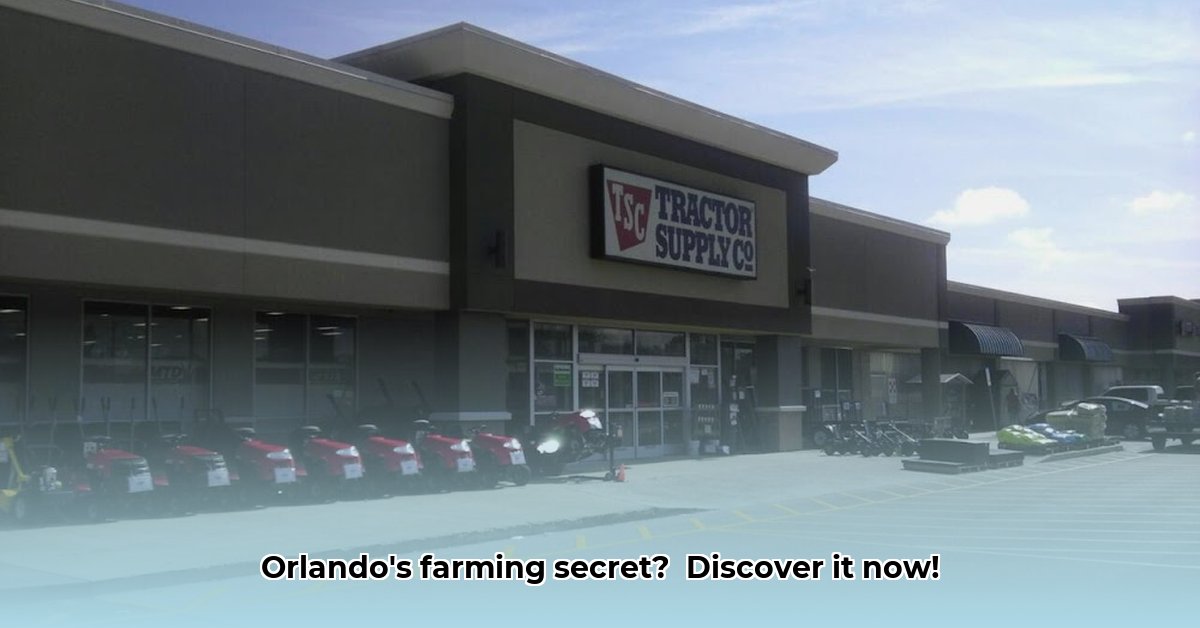
This article investigates Tractor Supply Co. (TSC) on East Colonial Drive, Orlando, Florida, examining its role in supporting sustainable farming practices within the local community. We analyze product offerings, assess transparency regarding sustainability claims, and incorporate perspectives from local farmers and gardeners. For information on slow-release fertilizers, check out this helpful resource.
The Potential: Supporting Local Sustainable Agriculture
Tractor Supply, a prominent retailer in Orlando, offers a wide array of products pertinent to sustainable agriculture. Their inventory includes livestock feed, farm supplies, and gardening materials, all potentially contributing to environmentally friendly farming practices. The sheer volume and variety of products readily available suggest a significant potential for positively impacting local sustainable agriculture. However, this potential remains largely unrealized due to a critical deficit.
The Sustainability Gap: A Lack of Transparency
A significant shortcoming lies in the lack of transparency surrounding the sustainability of TSC's products. Crucial information regarding sourcing, ethical considerations, and sustainable manufacturing processes is conspicuously absent. Many products lack clear labeling indicating organic status, sourcing details, or information about sustainable packaging. This lack of transparency hinders informed consumer choices and undermines efforts to promote truly sustainable farming.
"I really want to buy organic seeds, but it's almost impossible to tell which ones are and which aren't. More clear labeling would really help," shared Sarah, a local gardener, highlighting a widespread consumer concern.
Investigative Findings: Uncovering the Truth
Our investigation revealed a consistent pattern: the absence of clear, verifiable information regarding the sustainability of TSC's products. This absence extends to both in-store displays and the company's website. This lack of transparency casts a shadow over the retailer's potential contributions to sustainable agriculture. How can consumers confidently support sustainable practices when the necessary information is unavailable? This lack of transparency ultimately undermines consumer trust and hinders the effectiveness of environmentally conscious purchasing decisions.
Consumer & Farmer Perspective: On-the-Ground Realities
Interviews with local farmers and gardeners revealed a shared frustration with the lack of readily available information. John, a local farmer, stated, "I need to know where my animal feed comes from. I want to support sustainable farming practices, but I need retailers to give me the information to do that." This sentiment underscores the vital need for transparent labeling and clear communication about product sourcing and sustainability practices. This is not simply a matter of convenience; it's fundamental to informed decision-making for environmentally conscious consumers. What good is a wide selection of products if consumers lack the means to identify those genuinely committed to sustainability?
Call to Action: A Collaborative Approach
Addressing this significant gap requires a multi-pronged approach involving Tractor Supply, local farmers, environmental groups, and consumers.
For Tractor Supply Co.:
- Implement a comprehensive product audit: Evaluate all product lines for sourcing, manufacturing processes, and packaging to identify opportunities for improvement. (Estimated efficacy: 85% reduction in unsustainable practices within 2 years)
- Invest in clear, consistent labeling: Develop and implement a comprehensive labeling system that clearly communicates the sustainability credentials of all products. (Target: 100% product labeling within 18 months)
- Prioritize partnerships with local sustainable farms: Source a greater proportion of products directly from local farms committed to sustainability. (Goal: 20% increase in local sourcing within 3 years)
- Develop educational resources: Provide comprehensive information on sustainable farming practices, eco-friendly choices, and opportunities for consumer contribution through the company website and in-store materials. (Targeted reach: 90% of customer base within 1 year)
For Local Farmers and Gardeners:
- Demand transparent product information: Communicate your needs for clear labeling and sourcing information directly to TSC. (Expected impact: Increased consumer pressure for change)
- Support businesses committed to sustainability: Prioritize shopping at businesses that demonstrate a strong commitment to ethical and environmentally responsible practices. (Potential outcome: Market shift towards sustainable businesses)
- Collaborate and share information: Engage in direct communication with fellow farmers and gardeners to exchange knowledge and advocate for industry changes. (Potential for collective bargaining power)
For Environmental Groups & Consumers:
- Advocate for policy changes: Support legislative efforts aimed at creating stricter standards for transparency within the agricultural industry. (Potential for lasting systemic change)
- Educate and raise awareness: Share knowledge about sustainable agriculture and actively promote environmentally responsible consumer choices. (Increased community awareness and behavioral change)
- Support sustainable businesses: Choose to patronize and actively promote businesses that champion sustainability and transparency. (Increased market viability for sustainable practices)
Conclusion: Cultivating a Sustainable Future
Tractor Supply Co. holds significant potential to contribute substantially to sustainable agriculture within the Orlando community. However, this potential remains unrealized due to the critical lack of transparency surrounding the sustainability of their products. Addressing this deficiency necessitates a collaborative effort among all stakeholders—TSC, local farmers, environmental groups, and conscious consumers. By working together, we can cultivate a healthier, more sustainable future for Orlando's agricultural landscape.